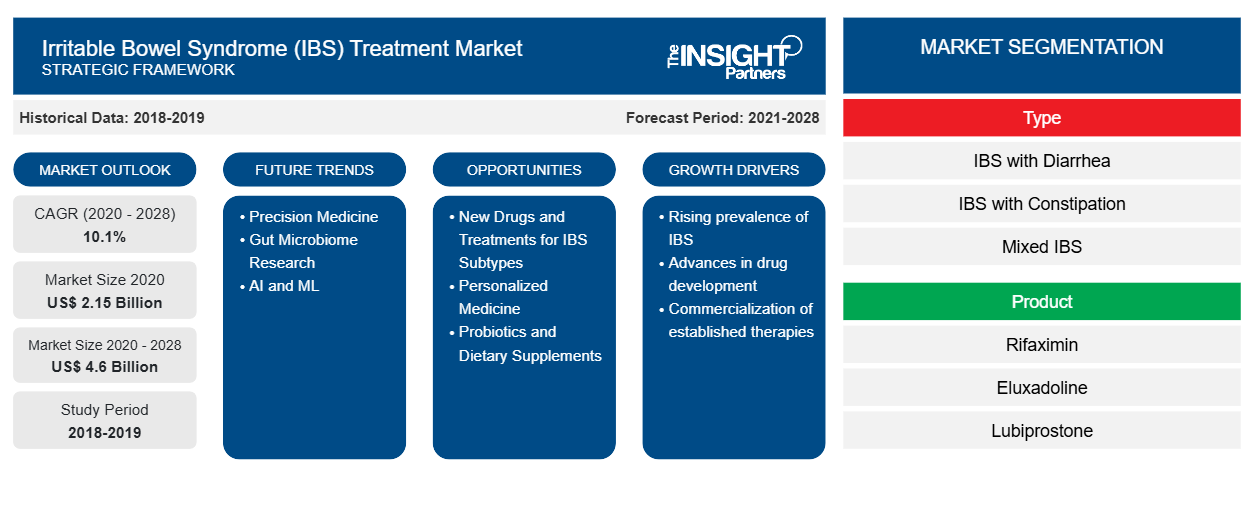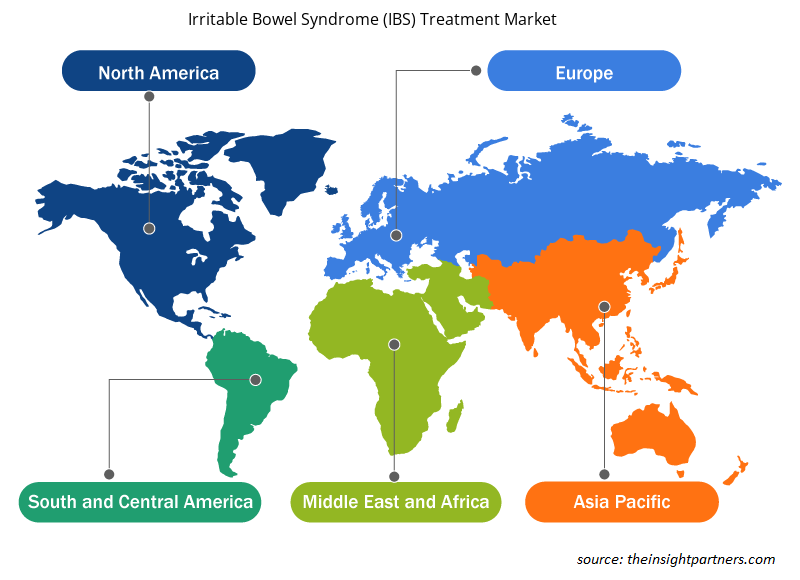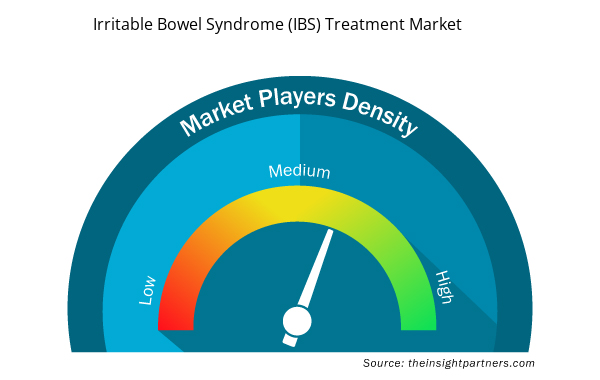The irritable bowel syndrome (IBS) treatment market was valued at US$ 2,153.89 million in 2020 and is projected to reach US$ 4,600.30 million by 2028; it is expected to grow at a CAGR of 10.1% from 2021 to 2028.
The major factors such as the increasing prevalence of irritable bowel syndrome diseases and rising research & development activities drive the market growth. However, the limited number of product availability and treatment inefficiency restrain the market growth. IBS is a common chronic condition that affects the abdominal organ, large intestine. It is also known as spastic colon, mucous colitis, irritable colon, and spastic colitis. The condition is much different than inflammatory bowel disease. It shows symptoms such as cramping, abdominal pain, bloating, gas, and diarrhea or constipation, or both at the same. If the symptoms are mild, they can be managed by changing stress, lifestyle, and diet. On the other side, severe symptoms are treated with medication and counseling.
In APAC, many measures have been implemented to contain the spread of novel coronavirus that causes COVID-19. The measures have disrupted the operations of many companies in various industries, including healthcare industry. Staff quarantine, supply-chain failures, and reductions in demand have generated serious complications for companies. Also, there has been a significant drop in in-patient and out-patient care in private hospital chains. To relieve healthcare systems, many clinics are postponing noncritical appointments. This scenario is hindering the growth of the irritable bowel syndrome (IBS) treatment.
Customize This Report To Suit Your Requirement
You will get customization on any report - free of charge - including parts of this report, or country-level analysis, Excel Data pack, as well as avail great offers and discounts for start-ups & universities
Irritable Bowel Syndrome (IBS) Treatment Market: Strategic Insights

- Get Top Key Market Trends of this report.This FREE sample will include data analysis, ranging from market trends to estimates and forecasts.
You will get customization on any report - free of charge - including parts of this report, or country-level analysis, Excel Data pack, as well as avail great offers and discounts for start-ups & universities
Irritable Bowel Syndrome (IBS) Treatment Market: Strategic Insights

- Get Top Key Market Trends of this report.This FREE sample will include data analysis, ranging from market trends to estimates and forecasts.
Market Insights
Increasing Prevalence of Irritable Bowel Syndrome and Associated Conditions
Irritable bowel syndrome is a majorly observed chronic gastrointestinal condition that is caused due to disturbances in bowel habits and abdominal pain. The disease is also known as spastic colon, irritable colon, mucous colitis, and spastic colitis. Irritable bowel syndrome shows symptoms such as abdominal pain, constipation, diarrhea, and cramping. Health systems across the regions are witnessing considerable growth in the incidence of irritable bowel syndrome. A data published by International Foundation for Gastrointestinal Disorders states that among all IBS patients, about 40% patients have mild IBS, around 35% have moderate IBS, and an estimated 25% suffer from severe IBS. Many people don't recognize IBS symptoms.
Certain factors such as food allergies, developing stages of gastroenteritis, sporadic movements of colon, abnormal composition of serotonin in colon, and mild celiac disease are among the risk factors that can cause IBS. These factors are projected to accelerate the rate of IBS prevalence across the world. For instance, according to a study published on NCBI in 2018, IBS is estimated to affect around 10% to 16% of the US population each year. Such staggering prevalence of IBS is likely to boost the irritable bowel syndrome (IBS) treatment market during the forecast period.
Type-Based Insights
Based on type, the Irritable Bowel Syndrome (IBS) Treatment market is segmented into mixed IBS (IBS-M), IBS with diarrhea (IBS-D), and IBS with constipation (IBS-C). In 2020, mixed IBS (IBS-M) segment held the largest share of the market. Also, the same segment is anticipated to register the highest CAGR during the forecast period. The rising prevalence of IBS among women and men are anticipated to propel the demand for the medicines that can treat combined symptoms of constipation and diarrhea. The prevalence of IBS is higher in the aging population. Therefore, the demand for medicines to treat mixed IBS is likely to grow significantly during the forecast period,
Product-Based Insights
Based on product, the irritable bowel syndrome (IBS) treatment market is segmented into rifaximin, eluxadoline, lubiprostone, linaclotide, and others. The linaclotide segment held the largest share of the market in 2020. Also, the same segment is estimated to register the highest CAGR in the market during the forecast period. The market growth for the segment is attributed to the factors such as the increasing manufacturing of generic version of linaclotide and rising market consolidation for developing and commercializing linaclotide to treat IBS.
Distribution Channel-Based Insights
Based on distribution channel, the irritable bowel syndrome (IBS) treatment market is segmented into hospitals pharmacies, drug stores and retail pharmacies, and online pharmacies. In 2020, the hospitals pharmacies segment held the largest share of the market. However, the drug stores and retail pharmacies segment is expected to register the highest CAGR during the forecast period.
Companies operating in the irritable bowel syndrome (IBS) treatment market adopt the product innovations strategy to meet the evolving customer demands across the world, which also permits them to maintain their brand name in the global market.
Irritable Bowel Syndrome Treatment Irritable Bowel Syndrome (IBS) Treatment Market Regional Insights
The regional trends and factors influencing the Irritable Bowel Syndrome (IBS) Treatment Market throughout the forecast period have been thoroughly explained by the analysts at Insight Partners. This section also discusses Irritable Bowel Syndrome (IBS) Treatment Market segments and geography across North America, Europe, Asia Pacific, Middle East and Africa, and South and Central America.

- Get the Regional Specific Data for Irritable Bowel Syndrome (IBS) Treatment Market
Irritable Bowel Syndrome (IBS) Treatment Market Report Scope
| Report Attribute | Details |
|---|---|
| Market size in 2020 | US$ 2.15 Billion |
| Market Size by 2028 | US$ 4.6 Billion |
| Global CAGR (2020 - 2028) | 10.1% |
| Historical Data | 2018-2019 |
| Forecast period | 2021-2028 |
| Segments Covered |
By Type
|
| Regions and Countries Covered | North America
|
| Market leaders and key company profiles |
Irritable Bowel Syndrome (IBS) Treatment Market Players Density: Understanding Its Impact on Business Dynamics
The Irritable Bowel Syndrome (IBS) Treatment Market is growing rapidly, driven by increasing end-user demand due to factors such as evolving consumer preferences, technological advancements, and greater awareness of the product's benefits. As demand rises, businesses are expanding their offerings, innovating to meet consumer needs, and capitalizing on emerging trends, which further fuels market growth.
Market players density refers to the distribution of firms or companies operating within a particular market or industry. It indicates how many competitors (market players) are present in a given market space relative to its size or total market value.
Major Companies operating in the Irritable Bowel Syndrome (IBS) Treatment Market are:
- Ironwood Pharmaceuticals, Inc.
- AbbVie.
- Sebela Pharmaceuticals, Inc.
- Takeda Pharmaceutical Company Limited
- Alfasigma S.p.A.
Disclaimer: The companies listed above are not ranked in any particular order.

- Get the Irritable Bowel Syndrome (IBS) Treatment Market top key players overview
Irritable Bowel Syndrome (IBS) Treatment Market – by Type
- IBS with Diarrhea (IBS-D)
- IBS with Constipation (IBS-C)
- Mixed IBS (IBS-M)
Irritable Bowel Syndrome (IBS) Treatment Market – by Product
- Rifaximin
- Eluxadoline
- Linaclotide
- Lubiprostone
- Others
Irritable Bowel Syndrome (IBS) Treatment Market – by Distribution Channel
- Hospitals Pharmacies
- Drug Stores and Retail Pharmacies
- Online Pharmacies
Irritable Bowel Syndrome (IBS) Treatment Market– by Geography
North America
- US
- Canada
- Mexico
Europe
- France
- Germany
- Italy
- UK
- Spain
- Rest of Europe
Asia Pacific (APAC)
- China
- India
- South Korea
- Japan
- Australia
- Rest of APAC
Middle East and Africa (MEA)
- South Africa
- Saudi Arabia
- UAE
- Rest of MEA
South and Central America (SCAM)
- Brazil
- Argentina
- Rest of SCAM
Company Profiles
- Ironwood Pharmaceuticals, Inc.
- AbbVie.
- Sebela Pharmaceuticals, Inc.
- Takeda Pharmaceutical Company Limited
- Alfasigma S.p.A.
- Astellas Pharma Inc.
- AstraZeneca
- Synthetic Biologics, Inc.
- Bausch + Lomb Incorporated
- Lannett Company Inc
- Historical Analysis (2 Years), Base Year, Forecast (7 Years) with CAGR
- PEST and SWOT Analysis
- Market Size Value / Volume - Global, Regional, Country
- Industry and Competitive Landscape
- Excel Dataset



Report Coverage
Revenue forecast, Company Analysis, Industry landscape, Growth factors, and Trends

Segment Covered
Type , Product , and Distribution Channel

Regional Scope
North America, Europe, Asia Pacific, Middle East & Africa, South & Central America

Country Scope
Argentina, Australia, Brazil, Canada, China, France, Germany, India, Italy, Japan, Mexico, Saudi Arabia, South Africa, South Korea, Spain, United Arab Emirates, United Kingdom, United States
Frequently Asked Questions
Who are the major players in the irritable bowel syndrome (IBS) treatment market?
The irritable bowel syndrome (IBS) treatment market majorly consists of the players such as Ironwood Pharmaceuticals, Inc., AbbVie., Sebela Pharmaceuticals, Inc., Takeda Pharmaceutical Company Limited, Alfasigma S.p.A., Astellas Pharma Inc., AstraZeneca, Synthetic Biologics, Inc., Bausch + Lomb Incorporated and Lannett Company Inc amongst others.
What are the driving factors for the irritable bowel syndrome (IBS) treatment market across the globe?
The factors that are driving growth of the market are increasing prevalence of irritable bowel syndrome diseases and increasing research & development activities.
What is irritable bowel syndrome (IBS) treatment?
Irritable bowel syndrome (IBS) is a common disorder that affects the abdominal organ, large intestine. It is also known as spastic colon, mucous colitis, irritable colon, and spastic colitis. The condition is much different than inflammatory bowel disease. However, it is a chronic condition which a person must manage for a longer period. It shows symptoms such as cramping, abdominal pain, bloating, gas, and diarrhea or constipation, or both at the same. These symptoms can be managed by changing stress, lifestyle, and diet. And the more severe symptoms are treated with medication and counseling.
Trends and growth analysis reports related to Life Sciences : READ MORE..
The List of Companies - Irritable Bowel Syndrome (IBS) Treatment Market
- Ironwood Pharmaceuticals, Inc.
- AbbVie.
- Sebela Pharmaceuticals, Inc.
- Takeda Pharmaceutical Company Limited
- Alfasigma S.p.A.
- Astellas Pharma Inc.
- AstraZeneca
- Synthetic Biologics, Inc.
- Bausch + Lomb Incorporated
- Lannett Company Inc

 Get Free Sample For
Get Free Sample For